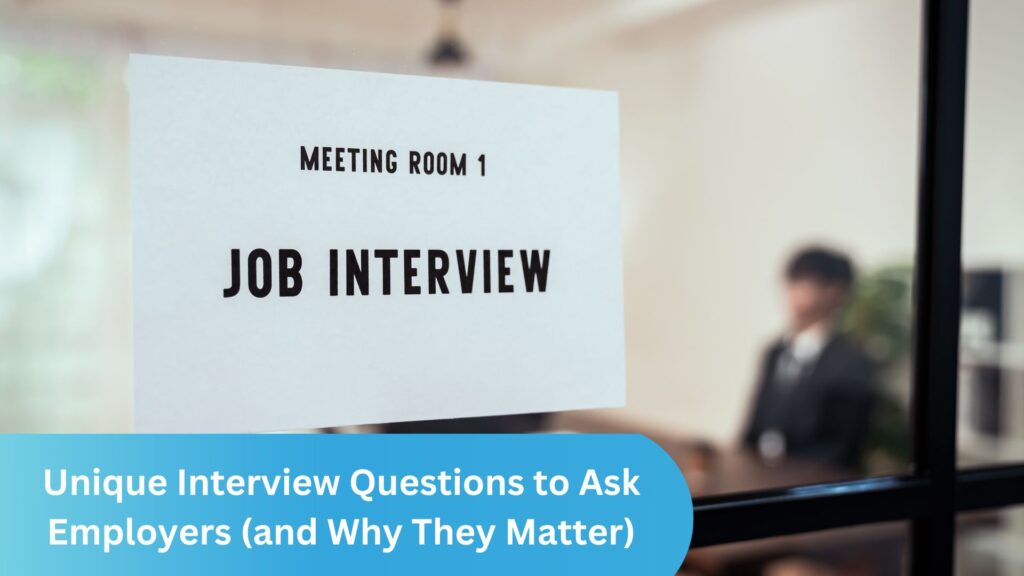Most job seekers spend hours practicing answers to common interview questions, such as “Tell me about yourself” or “What are your strengths?” But one area many candidates overlook is preparing unique questions to ask the employer.
Asking thoughtful questions isn’t just a formality — it’s one of the best ways to:
-
Show the interviewer that you’ve done your research.
-
Demonstrate curiosity about the role and the company.
-
Stand out from other candidates who only ask generic questions.
-
Gather insights that help you decide if the job is truly a good fit.
Hiring managers want to see candidates who approach the interview as a two-way conversation, not just a test. The right questions can spark meaningful dialogue, highlight your critical thinking skills, and leave a lasting impression.
Instead of defaulting to overused questions like “What’s the company culture like?” or “What’s a typical day here?”, you’ll want to prepare unique, strategic interview questions that dig deeper into the company’s goals, challenges, leadership style, and opportunities for growth.
This guide will walk you through some of the best questions to ask across different categories — from the role itself to team culture and company vision — so you can enter your next interview with confidence.
Why Ask Unique Interview Questions?
Employers expect strong candidates to flip the script at the end of the interview. When you ask the right questions, you gain more than just information — you show who you are as a professional. Here’s why it matters:
-
Shows Preparation: By asking questions specific to the role and company, you prove you’ve done your homework.
-
Reveals Company Values: The way an employer answers can tell you how they operate, how they treat employees, and what they prioritize.
-
Positions You as Engaged: Unique questions show you’re evaluating them as much as they’re evaluating you — signaling confidence and professionalism.
-
Gives You Insider Insight: Interviews are your chance to learn what’s really going on inside the organization, beyond what’s in the job posting.
Unique Interview Questions to Ask Employers

Questions About the Role
1. “What’s one challenge someone in this position would need to solve in the first 90 days?”
-
Why to ask: Shows that you’re proactive and ready to add value quickly.
-
What you’ll learn: The company’s immediate priorities and whether expectations align with your skills.
2. “Can you share an example of a recent project that went really well — and one that didn’t?”
-
Why to ask: Demonstrates curiosity about real performance, not just ideal scenarios.
-
What you’ll learn: How the team handles both successes and setbacks, which reveals culture and accountability.
3. “What qualities do your most successful team members have in common?”
-
Why to ask: Signals that you want to model success within the organization.
-
What you’ll learn: The soft skills and work habits valued most by leadership.
About the Team & Culture
4. “If I asked your team to describe their work style in three words, what would they say?”
-
Why to ask: Puts culture into practical, relatable terms.
-
What you’ll learn: Whether the team is collaborative, independent, fast-paced, or laid-back — and if that suits you.
5. “How does the team celebrate wins — big or small?”
-
Why to ask: Recognition practices reveal how supportive a workplace really is.
-
What you’ll learn: If achievements are acknowledged consistently or overlooked.
6. “What’s one tradition or ritual that makes your workplace unique?”
-
Why to ask: Helps you uncover company culture beyond generic “we’re collaborative” answers.
-
What you’ll learn: Whether the workplace feels personal and engaging or strictly professional.
About Leadership & Growth
7. “How does leadership measure success beyond just numbers or KPIs?”
-
Why to ask: Shows you care about long-term impact, not just short-term output.
-
What you’ll learn: Whether the company values innovation, collaboration, or employee development as much as performance.
8. “Can you share an example of someone who grew their career here in an unexpected way?”
-
Why to ask: Indicates your interest in career mobility and growth opportunities.
-
What you’ll learn: If the company supports internal promotions or flexible career paths.
9. “If I perform well, what might my career path look like in 2–3 years?”
-
Why to ask: Shows ambition and commitment to long-term success.
-
What you’ll learn: How structured career progression is — or if advancement requires moving elsewhere.
About the Company’s Future
10. “What are the biggest opportunities for the company in the next year?”
-
Why to ask: Positions you as someone thinking about the company’s growth, not just your role.
-
What you’ll learn: Whether leadership is focused on stability, expansion, innovation, or new markets.
11. “What’s one change or innovation the company is most excited about right now?”
-
Why to ask: Shows that you want to be part of forward-looking projects.
-
What you’ll learn: If the company embraces change and adapts well to industry trends.
12. “If I joined today, what’s something new I could help contribute to right away?”
-
Why to ask: Signals initiative and a desire to make an immediate impact.
-
What you’ll learn: How quickly they expect new hires to take ownership of responsibilities.
Should You Ask About Benefits Like Stock Options, PTO, and Healthcare?

Yes — but timing matters.
🔹 When to ask
-
First interview? Avoid benefit-heavy questions — you don’t want to look like you’re only interested in perks. Focus on the role, company, and culture first.
-
Later rounds or after an offer? This is the best time. By then, the employer knows you’re a serious candidate, and it’s perfectly professional to clarify benefits.
🔹 How to ask diplomatically
Instead of bluntly asking “What’s your maternity leave policy?” try framing it in a way that shows long-term thinking:
-
“Can you share more about how the company supports employees’ work-life balance, such as PTO or flexible scheduling?”
-
“Does the benefits package include equity or stock options for employees in this role?”
-
“What does the healthcare and wellness package look like for employees?”
-
“How does the company support parents or caregivers?”
🔹 Why it’s smart to ask
-
Stock Options/Equity: Reveals whether you’re truly sharing in the company’s success.
-
PTO & Leave Policies: Helps you assess work-life balance realistically.
-
Healthcare Packages: Can significantly impact your total compensation value.
-
Parental Leave: Signals how supportive the company culture really is.
Pro Tips for Asking Interview Questions
-
Don’t Overload
Keep your list focused. Aim for 3–5 strong, unique questions instead of rattling off a dozen. Employers will appreciate concise, thoughtful inquiries rather than a checklist. -
Tailor Them
Do your homework on the company and role. For example, if you’re interviewing with a fast-growing startup, ask about scalability or culture during rapid growth. If it’s a healthcare employer, ask about innovation in patient care or technology adoption. -
Listen Carefully
The best interviews feel like conversations. Don’t just wait for your turn — build on their answers. If they mention “team collaboration,” you could follow up with:
“What does collaboration look like across departments here?” -
Avoid Salary/Benefits First
Compensation, PTO, healthcare, and stock options are critical — but save those for later interview stages or once you have an offer. Early on, employers want to see your genuine interest in the role, not just the perks. -
Ask Open-Ended Questions
Questions that begin with “how,” “what,” or “can you share” tend to spark richer answers than simple yes/no responses. -
Balance Professional & Cultural Fit
Ask about both the business side (growth, leadership style, goals) and the human side (team dynamics, traditions, values). This gives you a full picture of what it’s like to work there.
Key Takeaway
Asking unique, tailored questions not only helps you stand out from other candidates, but also ensures you’re choosing an employer that aligns with your career goals, values, and lifestyle. The right questions transform an interview into a two-way evaluation — showing confidence and professionalism.
💡 Pro Tip: Before your interview, use a resource like WiseWorq to check real employee reviews and company insights. This allows you to prepare smarter, tailor your questions, and spot red flags before you commit to an employer.


